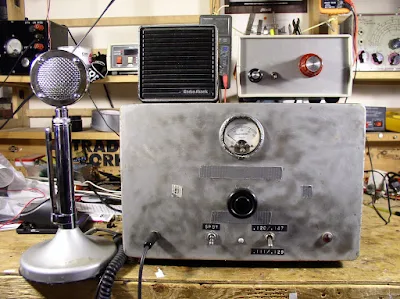 As I was aligning my "23/24 Re-cycle" 17 meter SSB rig, I noticed the tell-tale sounds of RF getting into my audio. (I guess I should be pleased -- my amplifiers are now producing enough RF to cause some trouble!) So this morning I went in and battened down the hatches in the AF part of the rig. Lead lengths were reduced. Unshielded cables were replaced with RG-174 (with due attention to "Murphy's Whiskers"). A ferrite bead was placed on the wire that carries voltage to the op-amp chip. I wrapped some foil (actually some of that conductive tape used to protect windows in alarm systems) around the plug on the D-104). And finally I cut out two pieces of PC board and made a shield for the whole AF section (see above). I think all this has had the desired effect. The audio sounds clean. I have the day off today, so if there are no Coronal Mass Ejections I hope to make some contacts on 17. Stay tuned!
As I was aligning my "23/24 Re-cycle" 17 meter SSB rig, I noticed the tell-tale sounds of RF getting into my audio. (I guess I should be pleased -- my amplifiers are now producing enough RF to cause some trouble!) So this morning I went in and battened down the hatches in the AF part of the rig. Lead lengths were reduced. Unshielded cables were replaced with RG-174 (with due attention to "Murphy's Whiskers"). A ferrite bead was placed on the wire that carries voltage to the op-amp chip. I wrapped some foil (actually some of that conductive tape used to protect windows in alarm systems) around the plug on the D-104). And finally I cut out two pieces of PC board and made a shield for the whole AF section (see above). I think all this has had the desired effect. The audio sounds clean. I have the day off today, so if there are no Coronal Mass Ejections I hope to make some contacts on 17. Stay tuned! Our book: "SolderSmoke -- Global Adventures in Wireless Electronics"http://soldersmoke.com/book.htmOur coffee mugs, T-Shirts, bumper stickers: http://www.cafepress.com/SolderSmokeOur Book Store: http://astore.amazon.com/contracross-20










